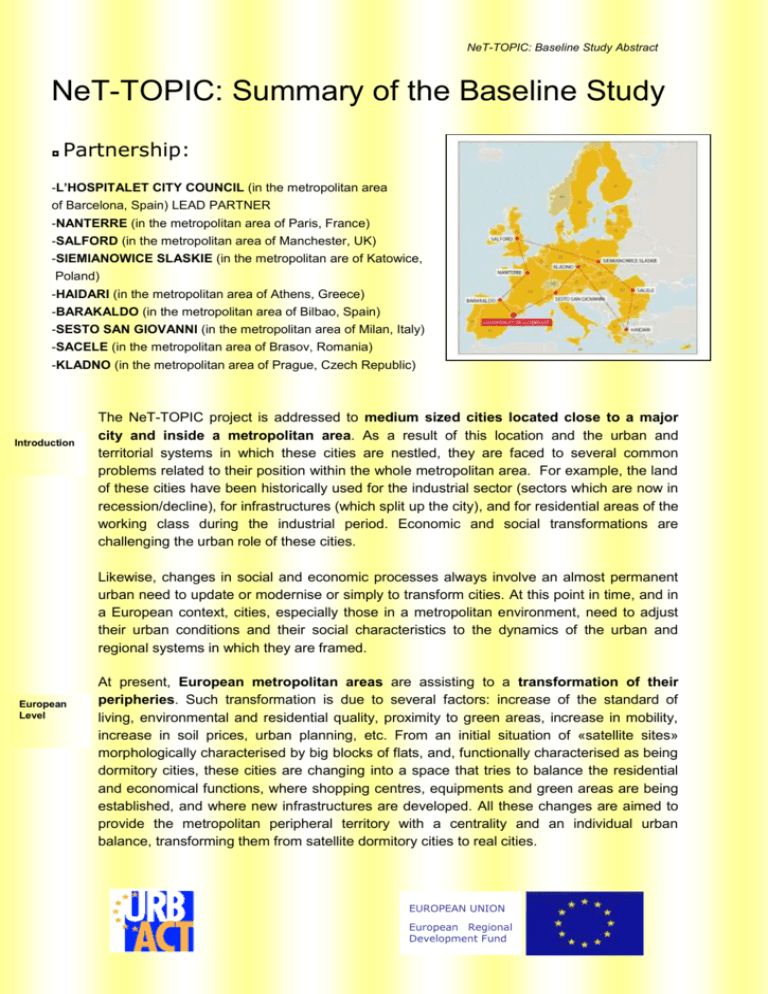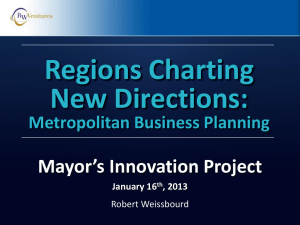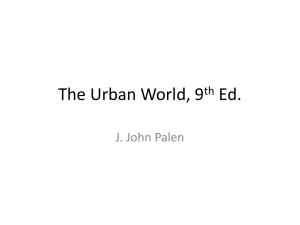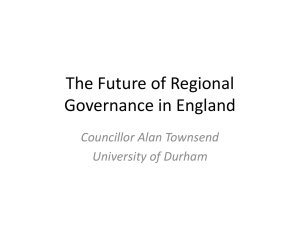Baseline Study Abstract
advertisement

NeT-TOPIC: Baseline Study Abstract NeT-TOPIC: Summary of the Baseline Study ◘ Partnership: -L’HOSPITALET CITY COUNCIL (in the metropolitan area of Barcelona, Spain) LEAD PARTNER -NANTERRE (in the metropolitan area of Paris, France) -SALFORD (in the metropolitan area of Manchester, UK) -SIEMIANOWICE SLASKIE (in the metropolitan are of Katowice, Poland) -HAIDARI (in the metropolitan area of Athens, Greece) -BARAKALDO (in the metropolitan area of Bilbao, Spain) -SESTO SAN GIOVANNI (in the metropolitan area of Milan, Italy) -SACELE (in the metropolitan area of Brasov, Romania) -KLADNO (in the metropolitan area of Prague, Czech Republic) Introduction The NeT-TOPIC project is addressed to medium sized cities located close to a major city and inside a metropolitan area. As a result of this location and the urban and territorial systems in which these cities are nestled, they are faced to several common problems related to their position within the whole metropolitan area. For example, the land of these cities have been historically used for the industrial sector (sectors which are now in recession/decline), for infrastructures (which split up the city), and for residential areas of the working class during the industrial period. Economic and social transformations are challenging the urban role of these cities. Likewise, changes in social and economic processes always involve an almost permanent urban need to update or modernise or simply to transform cities. At this point in time, and in a European context, cities, especially those in a metropolitan environment, need to adjust their urban conditions and their social characteristics to the dynamics of the urban and regional systems in which they are framed. European Level At present, European metropolitan areas are assisting to a transformation of their peripheries. Such transformation is due to several factors: increase of the standard of living, environmental and residential quality, proximity to green areas, increase in mobility, increase in soil prices, urban planning, etc. From an initial situation of «satellite sites» morphologically characterised by big blocks of flats, and, functionally characterised as being dormitory cities, these cities are changing into a space that tries to balance the residential and economical functions, where shopping centres, equipments and green areas are being established, and where new infrastructures are developed. All these changes are aimed to provide the metropolitan peripheral territory with a centrality and an individual urban balance, transforming them from satellite dormitory cities to real cities. EUROPEAN UNION European Regional Development Fund NeT-TOPIC: Baseline Study Abstract Without leaving behind the cohesion and the integration with the rest of the metropolitan areas, the nucleuses of the big cities’ peripheries are getting more self-sufficient from an urban planning point of view. The metropolitan functional area is being restructured by the growth of the peripheral and periurban areas. In this respect, and in order to ensure that peripheral areas of big cities become cities themselves, not only parts of a city, a new governance and a new metropolitan management is required. In the frame of the European Union, the urban problematic has acquired an increasing relevance in recent years. An important link between cohesion policies and the cities has been generated, stressing out the role of the cities and its contribution to the economic growth and the labour market of the regions. In this context, it is important to mention the “Communication from the Commission to the European Parliament” (COM 2006, dated 13.7.2006) Cohesion Policy and cities: the urban contribution to growth and jobs in the regions. Common challenges The subject of the NeT-TOPIC is closely related with these orientations and concerns to the extent that, the transformation of the metropolitan areas and the new role of the peripheral cities, represents a new strategic perspective to face up intraurban disparities, one of the most significant handicaps to achieve the full development of the European cities’ potential. The common contexts shared by these cities result in common challenges from a social, economic, urban morphology and infrastructures point of view, among others. From a social point of view, these cities tend to experiment important demographic changes and social dynamics, specifically high immigration; the drop in the predominantly young population; social polarization and, in some cases, antisocial behaviour and urban delinquency. Likewise, these social problems are also closely linked to economic problems such as changes in the labour market, delocalization of jobs towards the big city, economic diversification and trends to the tertiary sector. From an urban morphology and infrastructures point of view, these cities tend to suffer territorial disordering, lack of houses adapted to the new demand, industrial areas in disuse and lack of building land. Mainly, these cities need to adequate the land uses with their socio-economic and territorial area trends. The main challenge of these peripheral cities is then to develop a city model change process: to transform from peripheral cities to central cities, from residential to daytime cities (university, administrative or business centres), from industrial cities to technological/knowledge/service cities, from mono-functional to multi-functional. This represents, in synthesis, a new urban identity, an increase of the self esteem of its inhabitants and their identification with their city. As a result one of the biggest challenges of these cities concerns with their territorial governance and urban planning processes, throughout the promotion of new tools and approaches among their local governments in order to improve their urban transformation processes. It must also taken into account that the different challenges aforementioned are articulated around a bigger challenge: the elaboration of a local strategy, based on the leadership EUROPEAN UNION European Regional Development Fund NeT-TOPIC: Baseline Study Abstract of the local government, building alliances and public-private coalitions able to give cohesion to the new emerging actors, resulting from the mentioned urban transformation. Project sub themes Analysis of the individual cases Apart from the main subject matter of NeT-TOPIC, the project partners have identified some sub-themes, deviations of the main topic, common to all partner cities to be developed and analysed within the framework of the project. These themes are: the building of a new identity; the urban and metropolitan governance; the territorial fragmentation caused by road or infrastructures networks; the recovering and improvement of abandoned or obsolete areas; and the planning and management of the change from a monofunctional to a multifunctional city. After analysing the cases of the cities constituting the NeT-TOPIC thematic network, it can be seen that all of them share the same pattern of urban metropolitan growing: all performed a function as a suburb or as a peripheral area within the metropolitan site. It was the growing of the metropolitan area as a whole what framed the evolution of these suburbs. On the other hand, the social, economic and cultural transformations that happened in our societies during the two last decades, have structured new urban realities. Peripheral cities, created and developed as mono functional sites within the metropolitan context, are now transforming their realities and establishing their own strategies. This is a very complex issue because what they have inherited reduce the real possibilities of urban change. Effectively, in practice all cities belonging to the network suffer of fragmentation and lack of urban cohesion and territorial integration as a result of the road and railroads infrastructures that cross their areas. At the same time, their industrial background supposes the existence of areas and urban spaces that need to be recovered and reintegrated in the diversified and complex new post-industrial city model, if the city wants to find and develop a new city pattern, with more cohesion, identity and quality of life for their inhabitants. In all the cases, once the different contexts, policies and experiences of urban interventions of the different cities were analyzed, arises the need of redefining the urban transformation strategies linked to a new model that transform the peripheral and mono functional city into a multifunctional city, integrated in a diversified, interdependent and multi polar metropolis. It also emerges the need of sharing experiences and reflections around the coherence between the practical interventions of urban transformation (as projects ands plans) and the city model that is foreseen to be achieved. Are the implemented actions to improve urban quality, accessibility, housing, neighbourhoods and public spaces, effectively contributing to a new urban identity and a new city model? From the partner’s analysis emerges another question: since peripheral cities are parts of a whole, determined by the global logic of the metropolitan agglomeration, how to define and how to build a new type of relations and connections with the central city and with the whole metropolis? EUROPEAN UNION European Regional Development Fund NeT-TOPIC: Baseline Study Abstract Outputs The desired and foreseen outputs that the project wants to achieve deal with the learning and knowledge generated around the core theme of the network that is the change of the development model of the peripheral metropolitan cities. This goal wouldn’t be just the result of an exchanging activity or of sharing knowledge around good practices implemented by the associated cites. It should also integrate the outputs achieved by each city through the local support groups and the local action plans The network wants to produce new learning, new knowledge and to generate recommendations and proposals in his thematic domain. In this respect, we can conclude that NeT-TOPIC will produce outputs at two different levels: 1. At the network level, as a result of the exchanges; analyse and comparison of practices; analysis of partners city strategies; and contributions from outside of the NeT-TOPIC, either from cities or from academic bodies. At this level, NeT-TOPIC will produce practical outputs as a result of systematisation and capitalisation of the knowledge framed in the thematic focus “how peripheral and metropolitan cities establish renovated urban practices with the aim of changing their development model”. At this level, several outputs will be produced, such as, the Guidelines and Recommendations for carrying out Urban Planning processes for this kind of cities. 2. At local level in each partner city, the establishment, development and improvement of urban transformation strategies of the city model within de different metropolitan areas were these cities belong will come out as main outputs. Cities engage themselves to produce their own LAPs as well as to ensure the active participation and the consolidation of the ULSG as spaces of reflection, participation, monitoring and evaluation of the strategic actions in each city. So, at the end of NeT-TOPIC activities each one of the partner cities should feed the network with a very clear and defined output, elaborated with the following elements: - A Local Action Plan elaborated in a practical and operational way that will define the city strategy concerned with the own issues of the network. - Systematisation and capitalisation of the experiences carried out by the ULSG as a space of cooperation among local actors concerning the themes of NeT-TOPIC and the elaboration of the LAP. - A reinforced bond of knowledge and cooperation among each one of the partner’s cities and the managing authority of each country as a result of the participation of this body in the ULSG, in the monitoring of the project, in the outputs of the LAP and in the specific outputs of the network linked to its own thematic field. The work programme of NeT-TOPIC aims to build solid links at the network level and at the city level. Several activities have been organised to this end: EUROPEAN UNION European Regional Development Fund NeT-TOPIC: Baseline Study Abstract Workshops will be organized in the different partner cities, as cross cutting work spaces where each city will contribute showing their own achieved results and progress made in different phases by the respective ULSG in the elaboration of their own LAP. The network will ensure that those works carried out at local level by each city linked to the themes and issues of the network, become inputs to the network in terms of rapports and documents about relevant practices linked to the sub themes of the network. Thematic Seminars will be prepared, organized and evaluated by groups of partner cities (3 cities in each theme) through the constitution of focus groups that will be created with that goal. It will be another way of participation and involvement of the partner cities in dealing with the themes of the network. These outputs will be published in the project website so that it can be accessible for all partner cities. Procedures & methodology NeT-TOPIC establishes procedures and methodologies to tackle its core theme on “transformation of the urban development model in peripheral cities within metropolitan areas” through exchange, learning, systematisation and capitalisation processes. The outputs that NeT-TOPIC wants to achieve are the following: - Increase of the urban operators capacities belonging to the partner cities and of the governance procedures and methods used by those local operators. Improvement of urban planning processes through the elaboration and definition of LAPs that will result in tangible products of those processes Validation of good practices in urban transformation carried out in those cities through the research, benchmarking and systematisation. Several recommendations (as a result of systematisation) that will be useful for this kind of cities (at European level) on the core theme and on the different sub themes of the network. Regarding the exchange, learning, systematisation and capitalisation, NeT-TOPIC will pay special attention to each one of these steps in order to ensure processes as efficient as possible and to ensure optimal results and outputs. In this respect, the working methodology will require a high motivation from all the partner cities to learn, to exchange, to produce knowledge in a shared way, to generate validated recommendations as a result of these exchanges and learning processes. It must be mentioned, that at the same time, these exchanges, learning processes and knowledge production must trickle down in each of the partner cities through the ULSG and the main involved stakeholders and they should be relevant and significant in the elaboration of the LAPs. The local action plans should integrate several of these lessons and recommendations generated as a result of the network activities. See Baseline Study: http://urbact.eu/thematic-poles/sustainable-urban-development/thematic-networks/nettopic/baseline.html EUROPEAN UNION European Regional Development Fund






